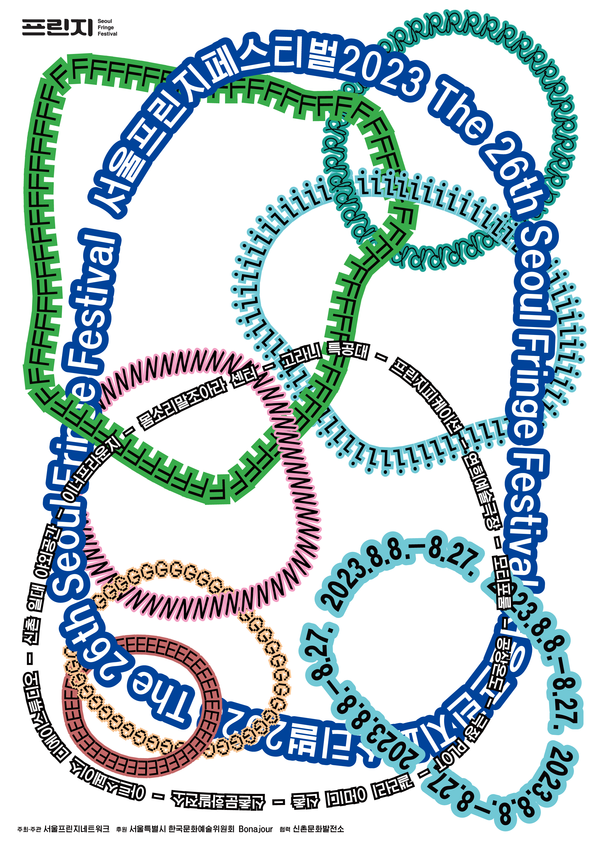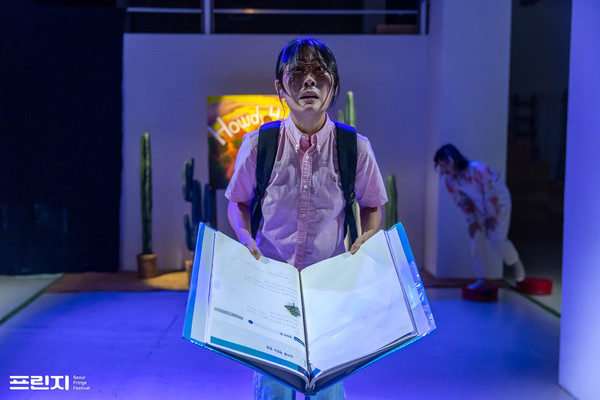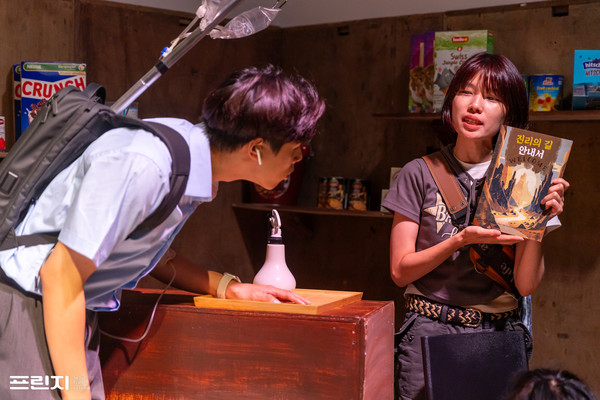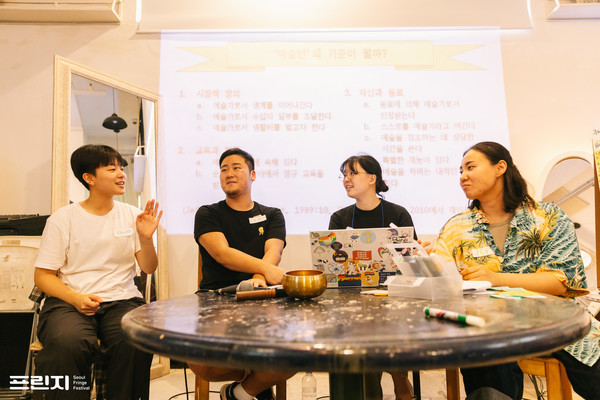“I respect the art of another ‘me’ just as the art of ‘me’ should be respected. I promise to be one of the 'us' that makes up a sustainable arts ecosystem." This is the "Declaration of Fringe Artists", which is the goal of the Fringe Network. Started in 1998 as an 'Independent Art Festival' on Daehak-ro, the Seoul Fringe Festival is an annual summer event where artists from various fields, such as dance, theater, and visual arts, participate. The Fringe Festival does not involve formal evaluations or selections of artists. It supports the innovative attempts of artists beyond standardized genres and forms.

Creative Group G.Rock P.Rock, To all the people who are walking through life: Walking Being
This play is very unique in its form - 'exhibition-play.' Unlike traditional theater, in this play, the audience can wander around the stage as both an exhibition space and a performance venue. This play offers solace to those who walk the path in search of truth and those who wander through the contemporary world. "You have always done your best in each moment. There's nothing to be afraid of. If you love your own life, everything you do is right."

CAH: Can you explain about ‘Creative Group G.Rock P.Rock’?
Bo-kyung: During our middle school years, we encountered fellow students, both majors and non-majors, through the school's theater club. After growing up and becoming adults, we reconnected and decided to put on plays together once again. We initially started with established scripts, but gradually, we became more interested in creating stage arts that stem from our own thoughts and imaginations. As a result, our endeavors are not confined to a specific genre. We are a fledging group that creates plays and performs arts each person pursues, together. CAH sat down with the performers of this play to ask them some questions.
CAH: The common theme of the play was 'walking'. Why did you choose the theme of 'walking'?
Bo-kyung: No one in our group is a theater major. So we simply asked the question, "What can we do on stage?" and started with a little lightheartedness saying, "We're just walking on stage." As we expanded and gathered our thoughts from "just walking" to "why we walk" and "how we walk," the current production was created.
Yu-jin: Last year was a tough year for me personally. I often asked myself 'why I was dragging something heavy, going somewhere hard.' I wanted to make a play about this theme. At first, I planned to make a play about asceticism, like the Sisyphus myth. Ironically, I thought that this ascetic path is not only in mythology, but it is similar to how we all live our lives. We are constantly walking towards somewhere, each in our own way. And since this is our first original play, we wanted to tell our own story.
CAH: The format of this play, ‘exhibition-play,’ is quite unique. Why did you choose this format and do you think it is useful for communicating effectively with the audience?
Chae-yeong: Our play doesn't explain the background of each character. The main contents are about how they walk and how they feel. Therefore, we chose an exhibition type of play because we think that if the audience knows what kind of life the characters have lived before watching the play through the exhibits, which will make it easier to understand the content of the play.
Bo-kyung: Also, it is a very unique experience for the audience to touch, hear, and see something up close instead of just passively watching the play. We chose to do an exhibition-play because we felt that these vivid exhibits would enrich the play. As a device to help the audience understand the play, we set up daily sounds of characters and a diary where the characters wrote their feelings. I think these devices would have helped the audience to understand and communicate with the characters.
CAH: Is there a line from the play that you would like to introduce to the readers and why?
Yu-jin: "I don't want to walk, I just want to stay where I am, like a stone, doing nothing," says the part-time worker in the play. That's the line impressed us as we were working.
Bo-kyung: Yes. That monologue is a big part of the overall message we're trying to convey. Many of the characters are walking hard, but along the way, they stumble upon failure. We experience many moments in our lives where we feel weak and exhausted. In real life, however, we try to quickly pick ourselves up and move on, rather than sit in those moments and allow them to heal us. I think this line is the best representation of that reality.
CAH: Do you have any advice for youths who may be feeling lost or on a path less traveled?
Lee Jin: As someone who graduated university long ago and has experienced the life of a wanderer, I think that at some point in your life, you must just hang in there. I think it's a skill to be able to hold on in the face of adversity, because it's worth it just to exist in the world.
Yu-jin: Since I graduated from university, there were many times when I felt that the things I wanted to do were insignificant. But what I realized while working on this artwork is that each step I take may seem insignificant at the time, but when I look back on it later, it is often more beautiful than I thought. So, even if the steps you take now seem insignificant, I hope that you can walk well step by step.

To all the people who are walking through life: Walking Being is not the story of a single protagonist, but about the life we all walk. Creative Group G.Rock P.Rock will also be performing the play in Goyang City this October. If you are interested in the play, why don't you watch it in October?
Project PAN, a fake documentary & audience participatory theater, one for the money, two for the show (but... where is the money?)
At the end of a play, the entire crew gathers to decide how to divide up the profits among the participants, and a lot of ideas are thrown around. The discussion heats up, and there is a hilarious and tense debate around the table. The audience becomes part of the play by becoming a member of the project board. In the second part of the play, which is presented as a forum, the audience is invited to participate in the discussion. The audience participation was a valuable time to hear not only from the members of Project Pan, but also from other artists. The performers of this play found time to sit down with CAH and answer some questions.

CAH: What inspired you to participate in the Seoul Fringe Festival?
Lanny: I performed a play called 'Sulae' at the Theater Club ‘토굴’ of the College of Social Sciences. The PD at the time asked me to run the play again. Unfortunately, our work was not selected in other theater festivals. Fringe festivals are free to participate, and anyone can go on stage without being judged, so we decided to participate in this festival.
CAH: The "participatory theater" organized by Project Pan is a unique style of play. What made you decide to create a play in this format?
Sung-ryun: There are various genres of participatory theater. In this case, the play is about the settlement of artists' payment. I think the audience has a lot to say about it, not just us, so we chose the genre of participatory theater with audience participation.
Lanny: Since last year's Fringe Festival, the topic of payment has been a hot topic. So last year, we organized a micro-forum on the topic of ‘Can we survive as an artist?’ Project Pan is mostly made up of non-professional members. It was a great experience to hear from people who have gone through the elite process of becoming an artist, and to hear different stories from them. I think it also connects well with the purpose of the Fringe Festival.
CAH: How did you chose the topic of ‘artists’ payment’?
Ping-pong: First, you have to start by focusing more on the perspective of "why can't our work be properly monetized?" rather than "can our artistic value be monetized?"
Lanny: It was a very fresh topic for us to talk about. The idea that our artistic endeavors shouldn't be evaluated only by money became clear to us. It's not just a matter of making money and paying ourselves. It's a process of sharing and reminding ourselves of what we've done, and it's much more meaningful than just counting money.
CAH: In the middle of the play, each character has a monologue or speech about their solution to the problem of how to reconcile profits. Why did you include this unique segment in the play?
Lanny: We read a lot of articles and books during the pre-production process. But using these complicated terms from the books is kind of awkward, so we decided to set up a device where we could talk about with that complicated terms without being awkward.
Q5. Now that the Fringe Festival is over, do you think what you were trying to tell through the show was conveyed well to the audience?
Sung-ryun: Artists are so immersed in their own fields and their own work that artistic community is not a well-networked ecosystem. Even when they do interact, it's often limited to their own field. However, at today's performance, we had artists from various fields, such as choreographers, stage designers, popular bands, and novelists. Although their areas of activity are different, they were all experiencing the same problems within the category of being an artist. Also, I felt relieved as an artist because they shared the idea of wanting to continue art careers despite having such problems. It was really nice to have a place where we could support each other with our problems, which expanded into 'our problems' instead of 'my problems'.
The 2023 Seoul Fringe Festival was a continuous exploration of new forms of art unlike anything I've experienced before. From exhibition-style play to self-sustaining payment models, it shattered many conventional notions I held about the realm of art. In this festival, artists break free from molds and gaze upon a wider world, pursuing liberated forms of art. If you're eager to become more acquainted with an art world that might have seemed rigid and daunting in the past, why not consider visiting next year's Seoul Fringe Festival?

